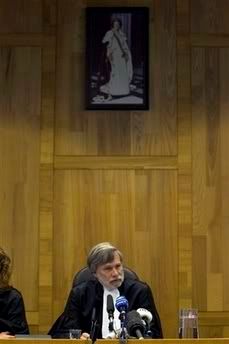An association of the genocide survivors from Srebrenica "the Mothers of Srebrenica" was seeking compensation for the failure of Dutch United Nations troops to prevent the genocide committed by the Serbian fascist aggressor in the U.N.-declared safe zone of the eastern Bosnian town of Srebrenica in July 1995,during the Serbian aggression against Bosnia.
The Hague District Court said the U.N.'s immunity — which is written into its founding charter — means it cannot be held liable in any country's national court.
"The court's inquiry into a possible conflict between the absolute immunity valid in international law of the U.N. and other standards of international law does not lead to an exception to this immunity," the judges wrote in their ruling.
A ruling lifting the U.N.'s immunity could have had far-reaching implications for the way the world body carries out its peacekeeping operations around the world.
At a hearing last month, Dutch government lawyer Bert Jan Houtzagers said that if a Dutch court decided it had jurisdiction in the case, "any court in any country could do so and that would thwart the viability of the United Nations."
Axel Hagedorn, a lawyer for the genocide victims from Srebrenica, said he would appeal today's decision. The case could go to the European Court of Human Rights.
"The court ruled that the U.N. has immunity, even if a genocide has happened, and that is in our opinion exactly what you can't accept," Hagedorn said.
He said the court should have overruled U.N. immunity because of the extreme circumstances of the case — the first genocide in Europe since the Genocide Convention was drawn up in the aftermath of the Holocaust.
"You have to change the jurisdiction on this, because otherwise you accept genocide," he said.
The genocide victims' lawyers earlier cited a figure of US$4 billion as a starting point for compensation negotiations.
Court spokesman Diederik Thierry said no appeal would be heard until judges rule in a separate court case by the genocide victims' against the Dutch state for its troops failure to prevent the genocide in Srebrenica.

Judge Hans Hofhuis is seen in the courtroom of The Hague District Court in The Hague, Netherlands, Thursday, July 10, 2008. A Dutch court ruled it has no jurisdiction in a civil suit against the United Nations by the genocide survivors from the eastern Bosnian town of Srebrenica, affirming U.N. immunity from prosecution even when genocide is involved. The court said the U.N.'s immunity, which is written into its founding charter, means it cannot be held liable in any country's national court.
The genocidal Serbian aggressor had overrun the Bosnian town of Srebrenica in July 1995, which had been declared a safe haven by the United Nations two years earlier. The Dutch peacekeepers did not fire a single shot in defense, and the UN did not respond to the Dutch commander's calls for air support.
Dutch soldiers in U.N. blue helmets did absolutely nothing to protect Bosnian civilians.They just watched on as Bosnian women and young girls were taken away and raped by the genocidal Serbian fascist aggressor and some 10,000 Bosnian civilians being taken away for summary execution.
The genocide victims' families launched the lawsuit against the Netherlands and the UN. in July 2007, arguing the Dutch U.N. soldiers were to blame for the genocide in Sreberenica because they refused crucial air support to their own troops defending the Bosnian town.
The Dutch U.N. soldiers abandoned the enclave instead,and the genocidal Serbian aggressor mass murdered up to 10,000 Bosnian civilians who had relied on protection from the Dutch U.N. troops.
Former leaders of the Serbians living in Bosnia,Serbian war criminals Radovan Karadzic and Ratko Mladic, both wanted by the U.N. war crimes tribunal in The Hague on genocide charges over Srebrenica, are still hiding from justice.
The Dutch government has always said its troops were abandoned by the U.N. which gave them no air support, but public documents actually show a network of Dutch military officials within the U.N. blocked air support because they feared their soldiers could be hit by friendly fire, the genocide victims families' lawyers said.
The Dutch government resigned in April 2002 in a scandal over its role in the genocide in Bosnia.Over 3,000 genocide victims have been buried so far in the Genocide Memorial Center in Potocari near Srebrenica. Mass graves are still being excavated.
An independent report by the Netherlands Institute for War Documentation in 2002 placed partial blame for the genocide in Srebrenica. It also faulted the U.N. for designating the area a "safe haven" for Bosnian war refugees, but not defining what that meant.
The U.N. tribunal set up to prosecute war crimes committed during the breakup of the former Yugoslavia has ruled that the mass murder at Srebrenica constituted genocide, and has convicted several Serbian war criminals for aiding and abetting genocide. It is still seeking the two prime criminal suspects in the genocide in Srebrenica : Serbian war criminals Radovan Karadzic and Ratko Mladic who are still hiding from justice somewhere in the genocidal Serbia.
.







No comments:
Post a Comment